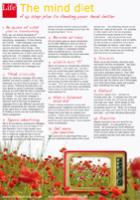Introduction
Is your mind getting flabby?
These days, we’re not only eating things that are bad for our physical health, but we’re also doing things that are making our minds flabby, rather than nurturing them. For example, the average person in the UK spends three and a half hours per day watching television! By feeding our mind like this, we can end up with a restricted view of the world. We can also lose sight of real life, feel bad about ourselves and forget to live our own lives. There are many things we could do to improve our mind diet, and make our lives more interesting, happy and wise in the process. This doesn’t mean the end of TV watching or anything like that – as with food, what we’re looking for is a good, balanced diet.
Put yourself on the 10-step mental diet on the other side of this sheet and watch the mental flab fall off as you gain a new outlook on life!
Main poster
The mind diet
A 10 step plan to feeding your head better
1. Be aware of what you’re consuming
Every day, we receive thousands of messages from a range of sources, including advertising, newspapers, TV, the internet and friends. These messages could take the form of emails, adverts, articles, opinions and many other things. Think about where these messages are coming from and whether any of them could have a particular bias – for example, when you’re reading a story in a newspaper, does the paper have a political bias that could affect the way it reported the story? Be aware of possible biases in any messages you receive.
2. Think critically
When you receive a message, think about whether you want to accept it or not. And remember you don’t have to accept it – it’s your choice. Following the last point, you may decide to ignore a particular message because you don’t feel the topic is important or because you feel its view of a topic is too biased. If a particular message is too biased, you may want to get a more balanced view of the topic by exploring messages from a few different sources with different perspectives (for example, looking at the same story in other newspapers) or by finding a source you can trust before you make a judgement.
3. Ignore advertising
We’re surrounded by adverts and messages telling us that we can only be happy if we look beautiful, live in huge houses, have lots of money and buy loads of new things. This is of course nonsense but it can be easy to get sucked into this way of thinking by adverts, and for us to start feeling bad about ourselves and our lives as a result. So why not just cut adverts out of your life by ignoring them? Try it!
4. Become ad-savvy
It’s not always easy to ignore advertising as it’s often difficult to work out what is advertising and what isn’t - for example, when it’s hidden in newspaper articles. Make yourself ad-savvy – be on the lookout for messages that could have been developed to advertise something.
5. Watch less TV
We’re not saying you should stop watching TV altogether – just watch less. Use the time you would have spent watching TV to do other things – read, speak to friends, exercise – whatever you like. If you want to go all the way, try unplugging your TV and turning it to face the wall for a couple of weeks. Then see all the other things that you are able to do in that time, and whether these make you feel better than when you were watching TV!
6. Have a balanced mind diet
There’s nothing necessarily wrong with reading gossip magazines and watching TV! But try to balance this out with some other things that could help you expand your horizons. These could include reading more books, learning more about the world and exploring new cultural ideas – from classical music to philosophy.
7. Get more perspective
Take some time to stand back from your life and understand the reality of the world around you. The influences around us can distort our views of the world – for example, in 1982 nearly half of all the characters in prime-time social dramas on TV were millionaires! Learning about the world around us can help us keep a grip on reality, as well as help us understand more about the messages we receive. Learn about history, how much money most people really have, how other people live and anything else that gives you perspective.
8. Discuss
When you’re with friends, introduce some new topics into the conversation. Ask them their opinions on big questions like the meaning of life or what their values are, and have a discussion about it. Don’t feel awkward about introducing these topics – most people love talking about bigger issues when they get the chance, and it encourages us to think about these issues and possibly learn something from each other.
9. Reflect
Find some regular time – perhaps 10 minutes every day - to escape from the rush and stress of daily life, and just sit quietly and clear your head. Some people do this by meditating, while others simply find somewhere quiet to sit. While you’re sitting quietly, just clear your head of any thoughts and relax – you’ll feel refreshed afterwards!
10. Exercise
Regular exercise is not only good for our physical health – it is also great for our minds. It’s amazing how much difference regular exercise can make to your thinking. It can not only make you feel happier and more positive but also more alert and able to think better.
© 2009 Life Squared





